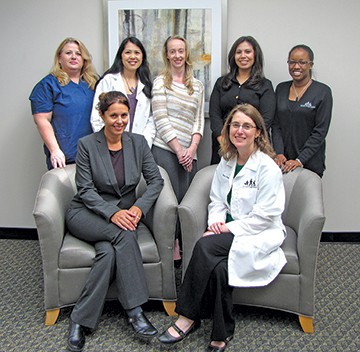By Elizabeth Heubeck
Girls are taking to sports fields in ever-increasing numbers, and many are playing as aggressively as their male counterparts. Subsequently, they’re also more likely to be sidelined with concussions. Now, a highly tra ined team of physicians at the Neurorehabilitation Concussion Clinic at Kennedy Krieger Institute is helping these young athletes get back in the game as quickly and safely as possible. While the clinic sees both male and female patients at its new Columbia location (Suite 200, 9730 Patuxent Woods Drive), its all-female team of doctors makes it particularly appealing to girls.
ined team of physicians at the Neurorehabilitation Concussion Clinic at Kennedy Krieger Institute is helping these young athletes get back in the game as quickly and safely as possible. While the clinic sees both male and female patients at its new Columbia location (Suite 200, 9730 Patuxent Woods Drive), its all-female team of doctors makes it particularly appealing to girls.
“We’ve had multiple families tell us it’s been really nice for their daughters. Some say their daughters are more comfortable seeing female doctors,” says Stacy Suskauer, M.D., medical director at the Neurorehabilitation Concussion Clinic at Kennedy Krieger Institute.
Typically, children and adolescents who suffer a concussion are seen at their local hospital’s emergency room. Kennedy Krieger’s Columbia-based clinic is designed primarily for those patients who, despite being managed post-ER visit by their pediatrician, continue to suffer from lingering symptoms – the most common reported by children is a headache. Other lingering symptoms may include problems with sleep, mood swings and academic struggles.
In these instances, the sufferer’s parents and primary care physicians may be looking for additional input, explains Suskauer. That’s where the clinic comes into play.
“This needs to be individualized medicine. There’s no way to tell in the ER when the child is going to get better or return to their activities,” Suskauer says.
Girl soccer players suffer more concussions than youth athletes engaged in any other sports, with the exception of youth football players.
Journal of Athletic Training, 2007: In the past decade, trips to emergency rooms for sports and recreation related traumatic brain injuries, including concussions, have jumped 60 percent.
Morbidity and Mortality Weekly Report, 2011:Recent studies report that female athletes (high school- and college-aged) report more post-injury symptoms after concussion.
American Journal of Sports Medicine, 2012: “What’s lacking in the field is a biological, brain-based measure of how the brain is doing post-concussion. Research is underway to find a clinically relevant tool to tell us that.” Stacy Suskauer




